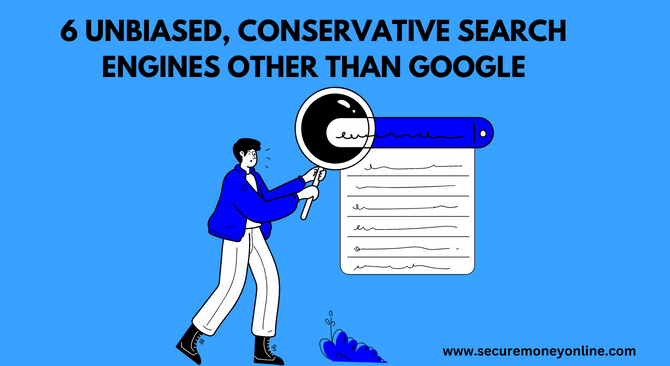
Today, I want to talk about the best conservative search engines; specifically, I want to review the five best alternatives to Google.
While some of us may remember the days of ask jeeves or yahoo answers; for a lot of people today, google can seem like the only option.
I mean, we literally say “google it” when we talk about looking something up on the internet, but google is not the only option out there believe it or not.
So, why does this matter? Well, public search engines which include google, bing, and yahoo aren’t actually that secure; and whenever you search using these platforms, you can be sure that they are recording your ip address and using cookies to build a digital profile on you which they can then use for all sorts of things including targeting ads.
What Are Conservative Or Private Search Engines?
Private or conservative search engines are a great way of remaining anonymous on the internet.
Most conservative search engines don’t track any information that can link you to your search terms, which means that your online searches stay your business, and you know it’s always better to be safe than sorry when it comes to protecting your information from the websites and search engines you use.
So, the bottom line is, conservative search engines are great alternatives to google because they offer users private, secure anonymous, non-tracking searches and unbiased search results.
Top 6 Conservative Search Engines that Don’t Track Or Steal Your Data
1. Duckduckgo
Generally, duckduckgo is good, it’s fast and it has pretty nice image search tools which I use very often for illustrating videos and it’s very configurable with tons of options to make it look or work like you want it to.
Now, it has ads provided by bing and this does lead to some amount of tracking when you click an ad, but you can disable them in the settings.
Duckduckgo had a few controversies lately though. First, the whole microsoft tracker thing. Duckduckgo billing itself as a private search engine was expected to not track anyone. And they even have a tracker blocker extension, and web browser for mobile devices .
The Problem is, while these tools were supposed to block trackers, they didn’t block microsoft trackers. This is so because duckduckgo has a search agreement with microsoft to provide results, and this fact was not disclosed anywhere.
So, people expected to be safe and private but they weren’t entirely. Duckduckgo’s privacy issue was eventually fixed but communication wasn’t great and they should have been transparent about that instead of waiting for people to discover it.
Aside this, duckduckgo was also accused of censorship as they de-rank some russian propaganda websites but that’s not something I want to get into right now.
Overall, duckduckgo is a good conservative search engine you just might want to check out.
2. Ecosia
Ecosia is financed by ads like most other search engines, and their ad income is used to plant trees which is a very reasonable goal.
Ecosia uses bing search results which are honestly good enough these days.
You could find everything you wanted using Ecosia. It’s fast enough, it has all the image search tools that one need, and it’s private.
They anonymize all search queries, they don’t sell any data and they encrypt searches. They also follow the do not track preference of your browser.
So, if that’s turned on, they don’t collect any data and if that’s off, they do have some usage statistics.
I also discovered that they had a big personal tracking id attributed to every user and that you could turn it off in the settings.
The company itself feels sound. It’s a non-profit organization, they only make money if you click on ads. Their servers use 100 renewable energy and they have their own solar plant. Of course, bing servers might not be entirely carbon neutral, so maybe it’s all for nothing but I do appreciate the effort that’s consistent with the mission.
It’s also important to note that ecosia servers are all around the world; which means they are not subject to the US patriot act if the closest server to you isn’t a US-based one. So, the US government cannot pilfer your data at will even if you’re not a US citizen.
Read also: How to start a freelance writing business with no experience 2023
3. D Search
D search is a search engine created by Bit Clave and it’s really interesting because it uses ethereum blockchain technology to protect your privacy; so it’s a decentralized secure engine.
Better yet, it actually give users the power to choose what personal information they want to share with marketers and advertisers.
This way, users get personalized ads for things that actually might interest them. But how do they do this? Well, D-search creates a contract of sorts directly between the user and the business creating the apps.
And on top of that, D-search incentivizes its users by actually giving them consumer activity tokens which is a crypto currency token, if they disclose their interest to advertisers.
So, D-search essentially creates a really transparent environment of information exchange and users directly benefit from giving that information if they choose to do so; and I think that’s a really cool system.
Basically, if you’re a crypto currency fan, D-search could be right up your alley as one of your go-to google alternatives.
4. Yippy
Yippy is a private search engine that was developed at Carnegie Mellon university and Yippy is what’s known as a meta search engine because it produces its own results by collecting data from other search engines.
Yippy is great because it can find websites that would otherwise be kind of hard to find and this makes it a great option for any academic or research heavy user.
According to their privacy policy page, yippy doesn’t collect any personal identifiable information plus on top of that, it doesn’t use cookies at all to identify or attract users behavior.
This search engine also allows users to view cached pages if they want or to filter their results by websites or sources or clouds. So, users end up with a lot of functionality from the search engine.
5. Start Page
Start page is a unique private search engine, and like several of these google alternatives, start page doesn’t track users search activity or record their ip address and on top of that, start page combines this promise of privacy with a great feature.
It actually uses results from google, and this is also a solid feature for google converts who do want to get the similar results from their search engine but without giving away any personal information
Now, another thing to keep in mind is that start page was developed by Ixquick which was a meta search engine created in 1998.
Because of this, start page features https support proxy services and a url generator. This url generator is awesome most especially as it allows the search engine to remember your settings without needing to install cookies on your browser. However, the end result is both personalized and private searching.
Read also: Why some search result for people disappear on Facebook 2023
6. Gibiru
Gibiru which was founded in 2009 is one of the fastest private search engines out there. This stems from the fact that unlike some of the other google alternatives , Gibiru doesn’t install any personalization or tracking cookies onto your computer.
This basically allows it to make online searches at super fast speeds and Gibiru also has extensions available for web browsers like Firefox, Edge and Chrome.
Conclusion
You can make Gibiru or any of the above mentioned conservative search engine your default browser if you want and by doing this, these browsers get to make private searches as convenient and easy as possible which I love so much.
Do let me know in the comments if you found these search engines useful, until next time , bye.


say NO to anti-white………anti-male…..and far-leftist, ideology pushing wokesters, who seek to indoctrinate you, and your children.